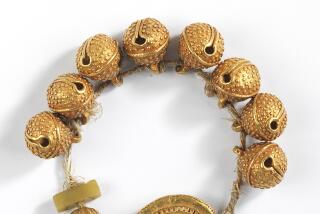After a 15-year battle, Harvard agrees to relinquish early photos of slaves

- Share via
BOSTON — Harvard University will relinquish 175-year-old photographs believed to be the earliest taken of enslaved people to a South Carolina museum devoted to African American history as part of a settlement with one of the subjects’ descendants.
The photos of the subjects identified by Tamara Lanier as her great-great-great-grandfather Renty, whom she calls “Papa Renty,” and his daughter Delia will be transferred from the Peabody Museum of Archaeology and Ethnology to the International African American Museum in South Carolina, the state where they were enslaved in 1850 when the photos were taken, a lawyer for Lanier said Wednesday.
The settlement marks the end of a 15-year battle between Lanier and the nation’s most elite university to release the 19th-century “daguerreotypes,” a precursor to modern-day photographs. Lanier’s attorney Joshua Koskoff told the Associated Press that the resolution is an “unprecedented” victory for descendants of those enslaved in the U.S. and praised his client’s yearslong determination in pursuing justice for her ancestors.
” ... Because of the combination of unlikely features — to have a case that dates back 175 years, to win control over images dating back that long of enslaved people — that’s never happened before,” Koskoff said in a phone interview.
The AP sent an email seeking comment from Harvard.
A complex history
Lanier, who lives in Connecticut, sued the Ivy League institution in 2019 for “wrongful seizure, possession and expropriation” of the images of Renty, Delia and five other enslaved individuals. The suit attacked Harvard for its “exploitation” of Renty’s image at a 2017 conference and in other uses. It said Harvard has capitalized on the photos by demanding a “hefty” licensing fee to reproduce the images.
The daguerreotypes were commissioned by Harvard biologist Louis Agassiz, whose theories on racial difference were used to support slavery in the U.S. The lawsuit says Agassiz came across Renty and Delia while touring plantations in search of racially “pure” slaves born in Africa.
To create the images, both Renty and Delia were posed shirtless and photographed from several angles.
“To Agassiz, Renty and Delia were nothing more than research specimens,” the suit says. “The violence of compelling them to participate in a degrading exercise designed to prove their own subhuman status would not have occurred to him, let alone mattered.”
In 2022, the Massachusetts Supreme Court ruled in Lanier’s favor and reaffirmed the merits of Lanier’s lawsuit against Harvard after a lower court judge ruled she had no legal claim to the images.
The state’s highest court recognized “Harvard’s complicity in the horrific actions surrounding the creation of the daguerreotypes,” saying that “Harvard’s present obligations cannot be divorced from its past abuses.”
A new home for Renty and Delia
In a statement Wednesday, CEO of the International African American Museum Tonya M. Matthews called Harvard’s relinquishing of the images a moment “175 years in the making.”
“The bravery, tenacity, and grace shown by Ms. Lanier throughout the long and arduous process of returning these critical pieces of Renty and Delia’s story to South Carolina is a model for us all,” she said.
The South Carolina museum has committed to working with Lanier and including her in decisions about how the story of the images will be told.
“It’s not an improvement just to move them from one closet in a mighty institution to another. And so really, the real importance of this is to allow these images to breathe, to allow the story — the full story — to be told not by a conflicted player in the story, which Harvard was from the beginning,” Koskoff said.
The attorney said “everybody has the right to tell the story of their own families.”
“That’s the least, most basic right we might have,” he said. “To be able to tell the story of her family with a museum that will allow her to tell it — I mean, you can’t do any better than that.”
In Lanier’s lawsuit, she asked for Harvard to acknowledge its complicity in slavery, listen to Lanier’s oral family history and pay an unspecified sum in damages. An undisclosed financial settlement was part of the resolution with Harvard announced Wednesday, but Koskoff said Harvard still hasn’t publicly acknowledged Lanier’s connection to them or its connection to perpetuating slavery in the U.S., Koskoff said.
“That is just left unanswered by Harvard,” he said.
He said Lanier isn’t expecting or waiting to hear from the institution but that the settlement speaks for itself.
“In the end, the truth will find you — you can only hide from it for so long,” he said. “Yes, history is written by the winners. But over time, you know, those winners look like losers sometimes.”
Willingham writes for the Associated Press.
More to Read
Sign up for Essential California
The most important California stories and recommendations in your inbox every morning.
You may occasionally receive promotional content from the Los Angeles Times.













